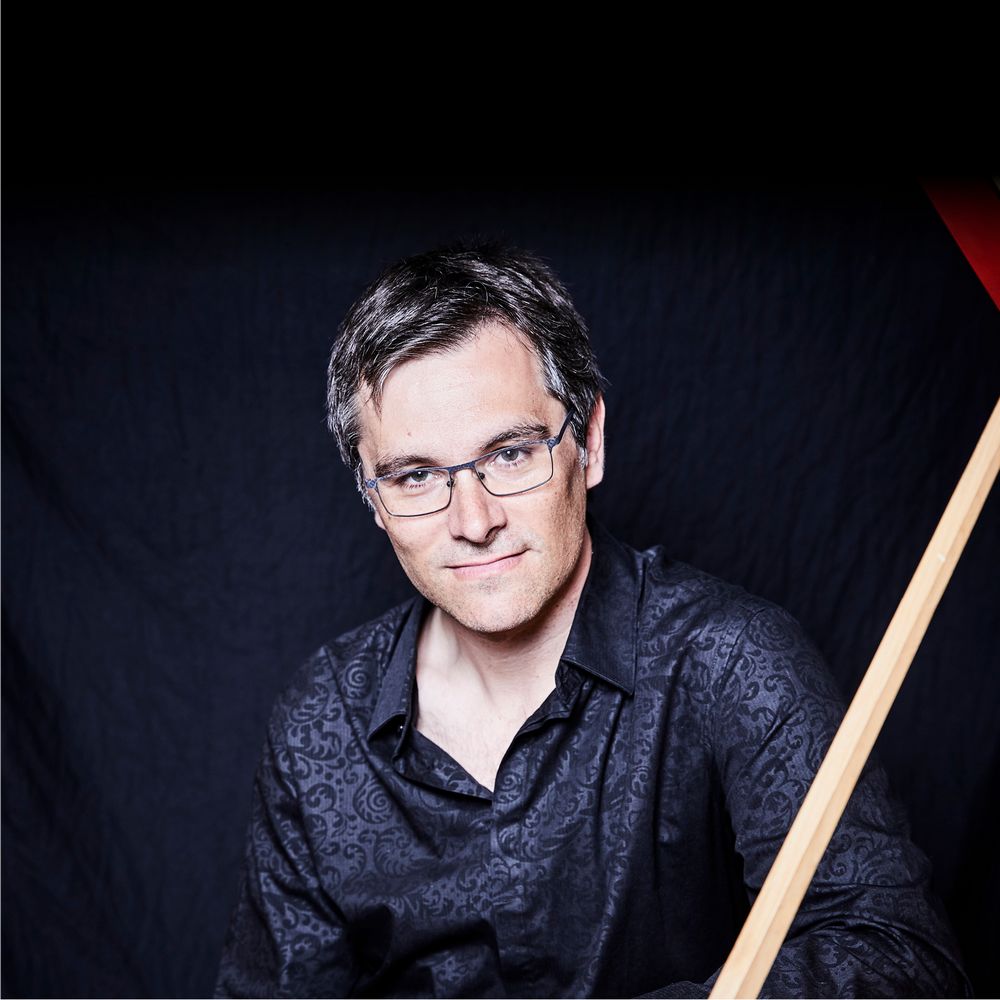Not playing by the rules
Dani Espasa cannot be pigeonholed: multi-instrumentalist, conductor, composer, producer, versatile, tireless, omnipresent… It is impossible to talk about the Catalan and European music scene of the last twenty years without mentioning him. Born in La Canonja in 1974, he already proved his eclecticism and his wide array of interests during his first study years: after finishing his intermediate degree in piano at the Tarragona conservatory and getting familiar with the piano jazz and the electric guitar in a school in Reus, he combined his classes to achieve his superior degree at the Barcelona conservatory with his studies on the harpsichord and the basso continuo in the same institution and the Esmuc. At the same time, he was diving more deeply in his passion for jazz at the Taller de músics and studying architecture at the Escola Tècnica Superior d’Arquitectura (UPC).
Espasa entered the world of Early Music with determination: barely two years after taking part in the Fringe of the Barcelona Festival of Early Music, he and oboist Pere Saragossa founded one of their most personal and most successful projects, the Baroque ensemble Vespres d’Arnadí. With this orchestra he has recorded several CDs, a first one with the Pièces de simphonie by Charles Desmazures (Muse d’Or, June of 2010), a second one devoted to religious works by Josep Mir i Llussà (1700-1764) and a third one with the title Anna Maria Strada, la favorita de Händel (2014), where they collaborated with soprano María Espada. The intense relationship that the ensemble and Espasa have with countertenor Xavier Sabata crystallized in their fourth studio CD, L’Alessandro amante.
These recordings will allow the future generations to understand how relevant Vespres d’Arnadí and Dani Espasa are to the Baroque scene, and must thus be celebrated. However, the character of the ensemble has been carved out on stage. Apart from performing regularly in concert halls as important as the Auditorio Nacional (Madrid), the Foyer at the Liceu, the Enric Granados (Lleida), the Auditori (Girona), the Gabinete Literario (Las Palmas) or the Sala María Cristina (Málaga), the orchestra has played in the most prestigious Early Music festivals like the Händel Festival in Halle, Prague, Festival de Música Antigua de Sevilla, Ostrava, Olomouc, Festival Via Stellae de Santiago de Compostela, Festival de Música Antiga dels Pirineus, Festival de Músiques de Torroella de Montgrí, Festival de Músiques Religioses de Girona, Ciclo de Cantatas de Bach de Madrid… Talking about festivals, it must be pointed out that Vespres d’Arnadí organised their own between 2016 and 2019 (nowadays it takes place at the Palau de la Música under the name Vespres Barrocs). From 2014 Espasa has been collaborating with the Peralada festival, where in 2018 he conducted up to four projects with his ensemble. Among these it is necessary to highlight the semi-staged version of Händel’s Rinaldo with Xavier Sabata. He would collaborate again with this countertenor in the 2021 edition with another Händel work, Orlando, with the stage direction of Rafael Villalobos.
Espasa’s services as a harpsichord player and organist are also asked for on a regular basis by ensembles such as Le Concert des Nations, La Capella Reial de Catalunya, Hespèrion XXI, L'Arpeggiata, The Rare Fruits Council, Les Sacqueboutiers from Toulouse, ensemble Mala Punica, La Caravaggia, La Hispanoflamenca and MÚSIca AlcheMIca. As a soloist, he has brought his version of the Golberg Variations by J.S. Bach all around the Iberian Peninsula and has recorded a CD with violinist Lina Tur Bonet, Imaginary meeting: Bach and Handel sonatas (2019).
Although Baroque music is basic in his artistic activity, Dani Espasa has also cultivated classical and contemporary music, among others with the OBC, the Liceu and the Mariinsky orchestras, the Orquestra de Cadaqués, the Real Filharmonia de Galicia, the Orquestra del Teatre Lliure, the Orquesta de cámara de España, the Nacional d'Andorra or the Simfònica del Vallès. One of his most stable relationships is with the Bcn216.
In spite of being devoted to high-profile music, his restless personality has brought him to embrace other forms of artistic expression, for instance conducting and arranging for Maria del Mar Bonet, producing and composing for Lídia Pujol, directing Olga Guillot’s Spanish tour (2003), making an incursion in Brazilian tropical music with the project Utròpic (2010), composing opening titles for TV shows or taking part as a pianist in movies as Transsiberian or Blancanieves.
Espasa’s name is also linked to theatre: he has conducted in plays as Rent (1999), El Temps de Planck (2000), La ópera de cuatro cuartos (2003), El jardí dels cinc arbres (2009), El joc de l'amor i de l'atzar (2014), In memoriam (2017), Els jocs florals de Canprosa (2018) or El enfermo imaginario (2020). He has also brought his own music to the stage with works for Casta Diva (2000), Macbeth (2002), Romeu i Ofèlia (2003), Bombollavà (2013), El rei Lear (2015), A Teatro con Eduardo (2016), El sueño de la vida (2019) or La Rambla de les floristes, being this last one awarded with the Butaca to the best music composition for a theatre play in Catalonia.
Dani Espasa’s story would not be complete without mentioning his teaching activity: since 2012 he is a professor of improvisation and chamber music at the ESMUC, and from 2021 he teaches harpsichord and basso continuo at the Historical Interpretation Programme at the Escuela Superior de Música Reina Sofía in Madrid. From 2015 he is the artistic director of the concert cycle at the Reial Monestir de Pedralbes (Barcelona).
It’s been a long time since Dani Espasa surpassed his country’s borders to establish himself as an indispensable figure in the European music scene, both with his own projects or as an essential piece in other people’s adventures, both from the harpsichord or behind the stage. Creativity and honesty without limits at the service of music.



